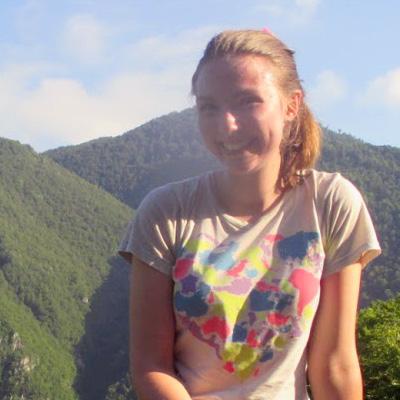“I am beyond grateful for the opportunity my scholarship provides, particularly freedom from debt. For me, this specifically manifests as being able to pursue my passions for Russian and Eurasian Studies and creative writing.”
How did your summer experiences clarify your career or academic interests (for example, a Metcalf internship or research opportunity)?
This summer I was selected for a State Department-funded critical language scholarship to continue my study of Turkish in Baku, Azerbaijan. This eight-week intensive summer language program allowed me to cover more than a year’s worth of Turkish, as well as immerse myself in Azerbaijani culture through my stay with a host family and various excursions. Before the program, I had studied Turkish for a year at UChicago, hoping that the language would give me a window into the Turkic-speaking countries and regions of the former Soviet Union, like Azerbaijan, to complement my Russian language and area studies degree. It was very rewarding to find that Turkish was indeed very helpful in understanding a post-Soviet country from a completely different perspective than my prior Russian-centric background had allowed me. For example, I was able to connect with a younger generation that does not see Russian as a relevant language to them. I was also able to do some writing while abroad, which has inspired me to enroll in a creative non-fiction class this quarter; previously, I had primarily been interested in fiction writing.
Please describe how you are choosing your course of study. Have there been clarifying moments in your Core classes or particularly inspiring professors who are helping identify your academic passions?
I have been choosing a diverse course of study of Core, major, and elective classes that I believe will help me gain a deeper understanding of my field: Russian and East European Studies. Two particularly inspiring professors were Kagan Arik and Jim Leitzel. I took Turkish classes with Kagan Arik, who, as a Central Asian studies specialist, encouraged me to apply Turkish skills to a Central Asian context. Jim Leitzel was my professor for my first quarter of the social sciences Core sequence Power, Identity and Resistance. He used to specialize in Soviet and post-communist transition economics, and I have been able to talk to him in office hours about his research and share my own thoughts and experience living in the former Soviet Union. These two professors contributed to my development of my current special interest, corruption in Central Asia, which I am considering as a focus of an internship this summer or potentially a thesis topic.
What activities are you involved with outside the classroom?
Outside the classroom I am a research assistant for Professor William Nickell of Russian Literature and History. This year I am helping him conduct research for a course he is teaching called Media and Power in the Age of Putin and Trump. Additionally, I am a virtual intern for Fulbright Central Asia through the Virtual Student Foreign Service program, for which I interview Fulbright scholarship recipients and write profiles of them for the website. I am also very involved in Model United Nations. I compete on the competitive team at conferences around the country and am co-leading crisis committees for both our high school and college conferences. Finally, I participate each quarter in a student-led fiction writing workshop.
If you could speak directly to the person whose gift supported your scholarship, what would you say?
I am beyond grateful for the opportunity my scholarship provides, particularly freedom from debt. For me, this specifically manifests as being able to pursue my passions for Russian and Eurasian studies and creative writing wholeheartedly without worrying about needing to secure a high-paying job after graduation in order to make student loan payments. Instead, I can consider graduate school and lower-paying but fulfilling jobs for NGOs, think-tanks and media outlets. I want to contribute to the small but very relevant field of Russian and Eurasian studies, but it is difficult to make a career in this without a graduate degree and unpaid summer internships, as most NGO, State Department and think-tank internships are unpaid. Lifting the financial burden imposed by undergraduate education frees me to consider these stepping stones for a successful career in the field. Thank you for your support.

